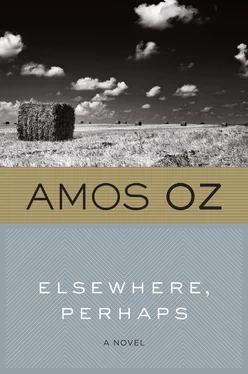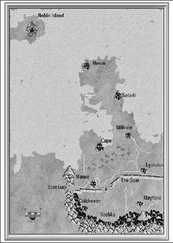Amos Oz - Elsewhere, Perhaps
Здесь есть возможность читать онлайн «Amos Oz - Elsewhere, Perhaps» весь текст электронной книги совершенно бесплатно (целиком полную версию без сокращений). В некоторых случаях можно слушать аудио, скачать через торрент в формате fb2 и присутствует краткое содержание. Год выпуска: 1985, Издательство: Mariner Books, Жанр: Современная проза, на английском языке. Описание произведения, (предисловие) а так же отзывы посетителей доступны на портале библиотеки ЛибКат.
- Название:Elsewhere, Perhaps
- Автор:
- Издательство:Mariner Books
- Жанр:
- Год:1985
- ISBN:нет данных
- Рейтинг книги:4 / 5. Голосов: 1
-
Избранное:Добавить в избранное
- Отзывы:
-
Ваша оценка:
- 80
- 1
- 2
- 3
- 4
- 5
Elsewhere, Perhaps: краткое содержание, описание и аннотация
Предлагаем к чтению аннотацию, описание, краткое содержание или предисловие (зависит от того, что написал сам автор книги «Elsewhere, Perhaps»). Если вы не нашли необходимую информацию о книге — напишите в комментариях, мы постараемся отыскать её.
Elsewhere, Perhaps — читать онлайн бесплатно полную книгу (весь текст) целиком
Ниже представлен текст книги, разбитый по страницам. Система сохранения места последней прочитанной страницы, позволяет с удобством читать онлайн бесплатно книгу «Elsewhere, Perhaps», без необходимости каждый раз заново искать на чём Вы остановились. Поставьте закладку, и сможете в любой момент перейти на страницу, на которой закончили чтение.
Интервал:
Закладка:
Eventually, you know, everyone dies, good and bad alike. Those who work for what is right and the wicked ones who destroy everything, and those who are simply degenerate, too. Everyone. They collapse, stop breathing, die, decompose, stink terribly after three or four days. Don't be angry with me for speaking tritely. I'm a soldier. Sometimes I say vulgar things, and then I'm cross with myself afterward. Yes.
It was the Dutch colonel who said this to Reuven during the tour, and he was speaking the truth. There's no denying it. Facts of life. But facts of life can be unfair, and unpleasant. And men must hate unfairness and unpleasantness, and wage war on them always.
Reuven Harish goes with his son Gai to the children's house. Before lights out he amuses the child by reciting some of his poems. Then father and son chat for a while about stamps and tourists, arms and agricultural implements, championships and roses. A kiss, a strong hand gently stroking a mop of blond hair, good night, good night.
Noga has a busy evening. At eight o'clock, a rehearsal for the dance sequence combined with readings, to celebrate the feast of Shavuoth. Noga is dancing as a vine, one of the seven kinds of fruit. At nine o'clock, a meeting of the editorial committee of the youth magazine. Noga is responsible for the "free expression" section.
Later on, the young people gather noisily in their own part of the kibbutz. Some collect round the radio to listen to the latest hits. Others sprawl on the grass and sing songs, making up their own bawdy lyrics. Finally, later still, between ten and eleven, Noga has an adventure of her own to look forward to. Gossips, be on your guard.
Noga's father takes a short cut across the lawn. Herzl Goldring, the gardener, catches sight of him from his veranda and says to his wife Nina under his breath:
"No wonder the children. Look at their teacher walking on the grass. No education, I tell you. Education isn't just a question of clever talk. It's a way of life. Here, Nina, they're savages."
"You're exaggerating," his wife answers sadly.
"I'm not exaggerating," Herzl whispers furiously.
Reuven pauses for a moment in the shadow of the carob tree, tucks his shirt into his trousers, and with a couple of youthful bounds he leaps onto the veranda of Ezra Berger's house. Ezra, meanwhile, is steering his heavily laden truck along dark, winding roads. He won't be back before midnight at the earliest. Bronka is alone in the room. Reuven greets her and smiles briefly. His voice is deep and controlled, as usual. Bronka smiles back, but says nothing. She looks up at him, dark-skinned and tired. She is sitting in an armchair, wearing a sleeveless gray dressing gown. Her legs are drawn up underneath her, emphasizing the clumsy heaviness of her thighs. The room is simply furnished, like all our rooms: one bed on wheels placed under another, higher bed to save space, A light gray bedspread with dark gray stripes. At the head of the bed, a chest of drawers, on top of which is an old radio set. A brown table covered in blue formica. A philodendron in a pot, climbing up a bamboo frame almost as far as the ceiling. A greenish carpet, ancient and threadbare. An empty armchair, Bronka's armchair, and three stools upholstered in a fabric matching the armchairs. A picture by van Gogh: a mysterious great cypress tree, a stormy sky, and two tiny figures walking along a path. A shelf with a few books, a dictionary, picture albums, some textbooks, and journals containing articles by Nehemiah Berger. Another shelf with little pot plants and cheap ornaments. Coffee cups decorated in gold laid out on the table. A dish of cookies baked by Bronka.
Reuven stretches out on the bed, where an open book lies upside down: The Intellectual Development of Young Children.
"Tired?"
"Yes."
"I saw you with the tourists this afternoon, by the clothes store. Why do you have to do it? Mundek or Tsvi Ramigolski could show them round. You could lie down and rest instead of running around in the heat of the afternoon."
"We've discussed all that before, Bronka. Let's drop the subject. Ezra?"
"As usual. Midnight, one o'clock."
"Coffee?"
"Right away. The kettle's been boiling for five minutes already. I was too lazy to get up."
"Lazybones."
"Like all grandmas."
"Why do you have to keep saying that all the time, Bronka?"
"I'm sure Einav's going to have a daughter."
"You mean you hope she will."
"I mean I can sense it. I don't make light of that kind of intuition."
"Does Ezra want a granddaughter, too?"
"Ezra. Ezra wants to be left alone. He's always tired."
"Has he said anything recently?"
"No. He hasn't said anything. Him? Never!"
"He's a strange man."
"Strange? I could think of a different adjective. Never mind. Drink your coffee now, before it gets cold. Sugar's in. You have to get to know Ezra, but it takes time. Have a cookie."
Coffee. Cookies. A few grapes to wash them down. Too sweet. She puts too much sugar in, as if you were a child. Spasmodic conversation, forced smiles. Fingers fidgeting involuntarily round the cookie dish. Listen to the news. Will there, won't there be any shooting tonight? I think they're hatching something. I don't think anything's going to happen for the time being, for two reasons. In the first place…
"What are you knitting? A sweater? For Oren?"
"Bootees for the baby."
"Einav ought to do something about that leg of hers. I've heard of some new exercises they've devised…."
"You know, Tomer's changed a lot since he's been married."
"About Noga. I know what I was going to tell you. It's as if she was struggling with some resentment. She's a little girl, and yet she isn't a little girl. She's so secretive. She never used to be so quiet with me. And she doesn't seem to take an interest in anything these days."
"It's an awkward age. Oren's the same. Oren refuses to be called Berger. He calls himself Geva. They say it was he who organized the disturbances on Seder night. Every day I hear fresh complaints about him."
"And Ezra?"
"He won't get awkward. Keeps out of it. Anyway, he never talks much."
"What's the music tomorrow night? Mozart?"
"Bach."
"Segal adores Bach. I don't enjoy his music. Too serious. I know it's an unpopular view, but it's true. Mozart's another matter. But Bach, really…"
"By the way, there was a letter from Germany today. From Zechariah."
"What does he say?"
"Nothing special. The usual sort of thing. Siegfried Berger and Isaac Hamburger are opening a branch in Frankfurt, and they're thinking about Berlin. They're expanding."
"Curse them both."
"You hate them, don't you?"
"I hate debased Jews. They debase themselves and all of us. Will you show me the letter?"
"Not now, Reuven. Why now? Later. Afterward."
"Is there?"
"Yes. As usual. A few lines. She doesn't say anything. Incidentally, there was a letter from Nehemiah today, too."
"From Jerusalem? Today?"
"Yes. Quite a coincidence. Letters from both brothers the same day."
"What's he got to say for himself?"
"I'll show you his letter afterward, too. He may be coming to stay for a week or two."
"Will we…"
"Don't worry, man, he won't interfere. I don't think he's going to come, though. Every year he threatens to come for a long stay, and in the end either he doesn't come or else, if he does come, he leaves after a couple of days. That's the way he is."
"What's he up to these days?"
"The same as usual. Researching. I don't know what in exactly."
"Researching?"
"Yes. Do you want some more coffee?"
"Later, later. Turn the radio off. Is it Stravinsky? I don't like it. It's too violent."
***
Bronka thinks about her body. With a feeling of disgust. She puts her knitting down and lets her hands fall to her thighs. She can almost feel, through the material, the swollen veins, the ugly black hair on her legs, the red rash. They say beautiful women find old age hardest to bear. I was never beautiful. I was always broad. I never had a figure like Einav's. But years ago I didn't think about my body like this; now I think about it, and I don't like it. It's like someone else's body. A stranger's. At night, when I can't sleep, and Ezra hasn't got back yet, I sometimes have the feeling that a strange, ugly woman is sleeping in my bed. I can smell her body. She sweats. She has a nasty, smelly discharge. She's not well. She smells unhealthy. She has something wrong inside her. There's a revolting dampness. There are some things I can't talk to Ezra about. Even in the early years. How strange that he was embarrassed with me. He didn't like looking at me, and he didn't like me to look at him when we were together. He wasn't generous with those eyes of his. As if he was doing his duty but without enthusiasm. No, that's not right. He was very enthusiastic, but he wasn't concentrating. His heart wasn't in it. Reuven is very gentle. He's careful, even in physical matters. As if he's handling something fragile. A woman needs strength, too. And violence. Neither of them is violent. Not completely. Right to the end. There's always something that holds back, that doesn't take part. And that's terribly humiliating for a woman. Father had an enormous body. Even without touching him, you could sense that he was very strong and warm. When he was about to kiss you good-night, you could feel his weight. Even when he was old: maybe because his long beard didn't go white even when he was sixty, when the Germans. He hardly ever beat me, and yet I always used to feel that he was on the point of beating me, flaying me alive.
Читать дальшеИнтервал:
Закладка:
Похожие книги на «Elsewhere, Perhaps»
Представляем Вашему вниманию похожие книги на «Elsewhere, Perhaps» списком для выбора. Мы отобрали схожую по названию и смыслу литературу в надежде предоставить читателям больше вариантов отыскать новые, интересные, ещё непрочитанные произведения.
Обсуждение, отзывы о книге «Elsewhere, Perhaps» и просто собственные мнения читателей. Оставьте ваши комментарии, напишите, что Вы думаете о произведении, его смысле или главных героях. Укажите что конкретно понравилось, а что нет, и почему Вы так считаете.












